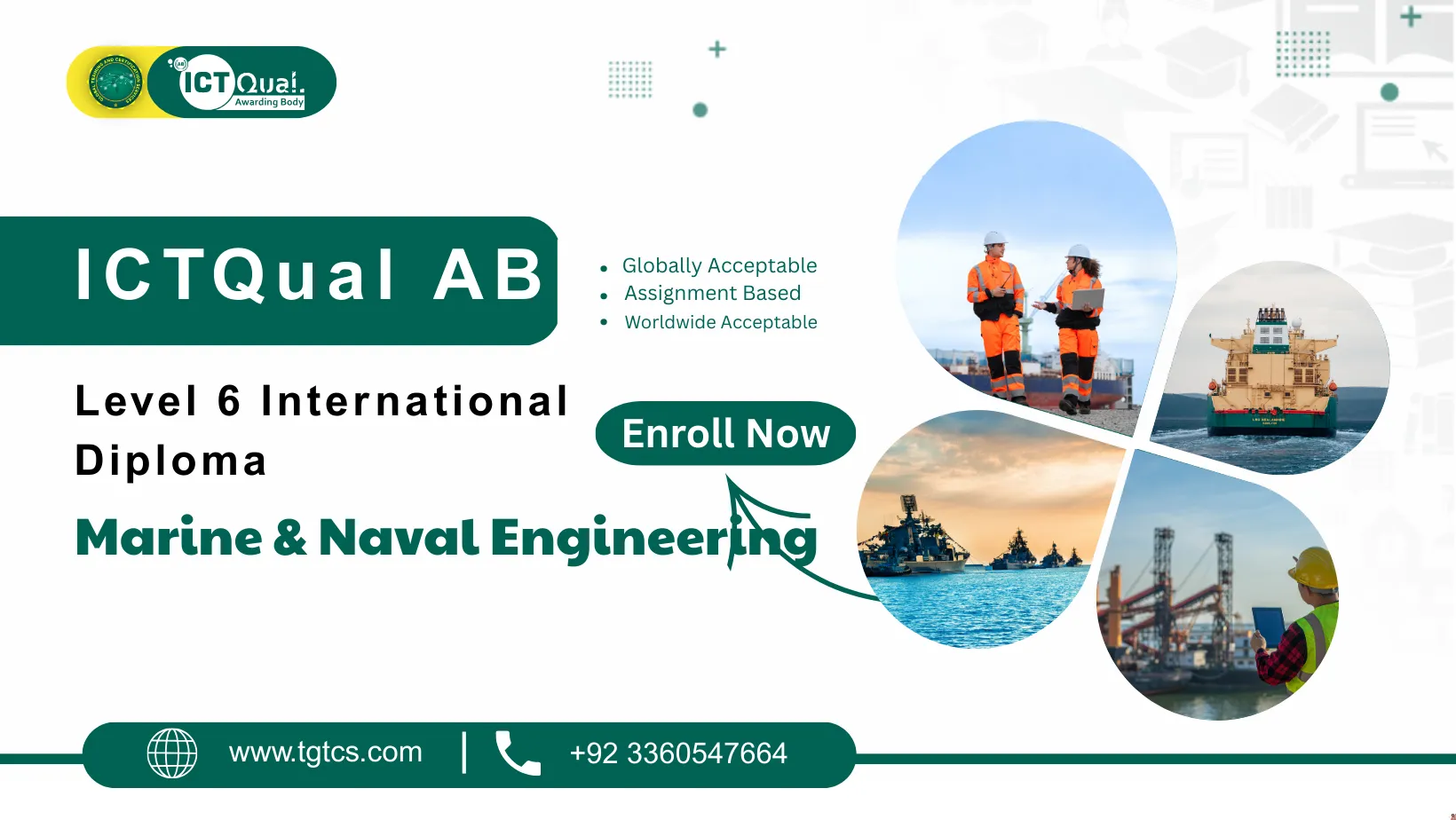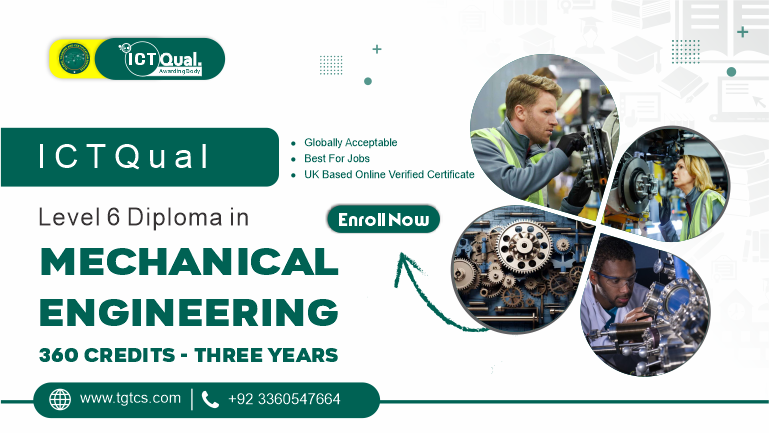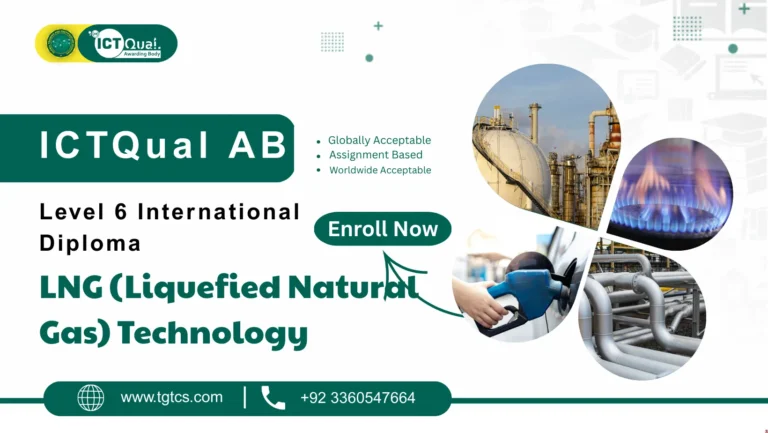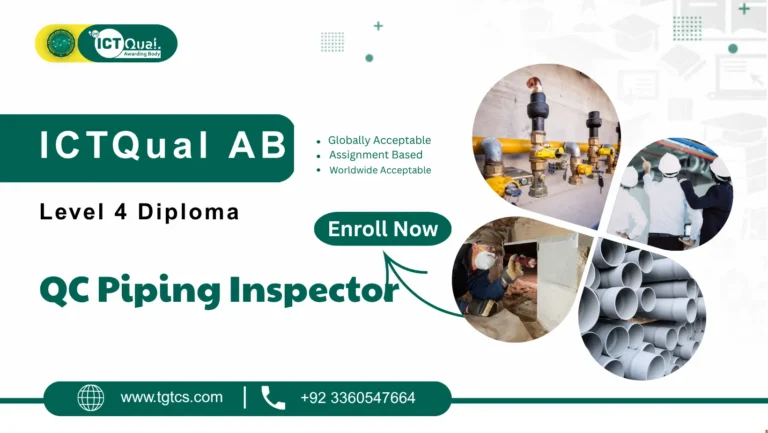ICTQual AB Level 6 International Diploma in Marine and Naval Engineering
The ICTQual AB Level 6 International Diploma in Marine and Naval Engineering is a globally recognized qualification designed to equip learners with advanced technical knowledge and practical expertise essential for a successful career in the maritime and naval engineering sector. As the global shipping, naval defense, and marine technology industries continue to expand, the demand for highly skilled marine engineers and naval professionals has never been greater.
This comprehensive Level 6 marine engineering diploma provides learners with in-depth knowledge of ship design, propulsion systems, marine machinery, naval architecture, and sustainable maritime practices. The program is fully assignment-based, allowing learners to study at their own pace from anywhere in the world, making it suitable for fresh graduates as well as experienced maritime professionals seeking to enhance their qualifications.
Learners will gain practical skills in marine engineering operations, ship maintenance, naval project management, and marine safety systems, along with theoretical understanding of fluid dynamics, corrosion control, and maritime regulations. The course also emphasizes modern maritime technologies, including automated vessel systems, naval defense applications, and sustainable shipping solutions, preparing graduates to meet the challenges of contemporary maritime industries.
The ICTQual AB Level 6 International Diploma in Marine and Naval Engineering is British Council verifiable, MOFA and Embassy attested, ensuring international recognition and credibility for employment, professional development, and iqama approval. Upon completion, graduates will be fully equipped for high-demand roles such as marine engineer, naval architect, ship operations manager, or maritime project leader, while gaining globally recognized credentials that enhance both career growth and professional mobility.
The Global Training and Certification Services is Approved Training Centre of ICTQual AB UK Ltd
Course Level and Credits
The ICTQual AB Level 6 International Diploma in Marine and Naval Engineering is a prestigious qualification offering 360 credits, reflecting its comprehensive curriculum and advanced level of study. This fully assignment-based program ensures learners gain an in-depth understanding of marine and naval engineering principles, ship design, propulsion systems, naval architecture, marine machinery, and modern maritime technologies. The Level 6 diploma is internationally recognized, making it a highly respected credential for professionals aiming to enhance their academic and career profile in the global marine and naval engineering sectors.
Mode of Study
This diploma offers flexible, self-paced learning that allows learners to study from anywhere in the world, accommodating the needs of working professionals, international students, and those balancing personal commitments. The fully assignment-based structure eliminates the need for rigid classroom schedules, providing learners the freedom to progress through the modules at their own pace while applying theoretical knowledge to practical maritime scenarios. This flexibility ensures a seamless learning experience, making it easier for candidates to complete the diploma without geographical or time constraints.
Global Recognition & Attestation
The ICTQual AB Level 6 International Diploma in Marine and Naval Engineering is globally recognized and verifiable through the British Council. Additionally, it is MOFA and Embassy attested, which makes it highly valuable for employment, professional development, and iqama approval in Gulf countries. This international validation ensures that graduates’ qualifications are credible and recognized by employers, regulatory authorities, and academic institutions worldwide, opening doors to career opportunities across multinational shipping companies, naval organizations, and maritime research institutions.
Eligibility and Flexibility
This qualification is suitable for both fresh graduates and experienced professionals seeking to advance their careers. Fresh learners are required to complete all 36 mandatory assignments within three years, providing a structured pathway to acquire the full range of skills and knowledge. Experienced professionals with a minimum of six years of verifiable relevant experience can fast-track the diploma by demonstrating their expertise in professional discussion meetings with an ICTQual AB approved assessor, bypassing the need to complete all assignments. This flexible pathway allows skilled individuals to gain recognition quickly while validating their practical experience.
Skills and Knowledge Gained
Learners of this diploma acquire a comprehensive set of technical and professional skills, including marine engineering operations, naval project management, ship maintenance, propulsion system analysis, and maritime safety practices. In addition, the program covers sustainable shipping solutions, automated vessel systems, and naval defense technologies. By combining theoretical knowledge with practical applications, the diploma prepares learners to handle modern marine and naval engineering challenges efficiently and innovate within their organizations.
Career Benefits
Graduates of the ICTQual AB Level 6 International Diploma in Marine and Naval Engineering are equipped for high-demand roles across the global maritime and naval sectors. Career opportunities include marine engineer, naval architect, ship operations manager, UAV and automated vessel specialist, and maritime project leader, among others. With internationally recognized certification and verified professional competencies, graduates can secure positions in shipping companies, naval defense organizations, and maritime research institutions. The diploma not only enhances employability but also provides a strong foundation for leadership roles and long-term career advancement in the marine and naval engineering industry.
Mandatory Unit
This qualification, the ICTQual AB Level 6 International Diploma in Marine & Naval Engineering, consists of 36 mandatory units.
Year 1 – Foundation in Marine & Naval Engineering
- Principles of Marine and Naval Engineering
- Engineering Mathematics
- Fundamentals of Mechanical and Electrical Engineering
- Materials Science and Engineering
- Engineering Drawing and Computer-Aided Design (CAD)
- Introduction to Fluid Mechanics and Hydrodynamics
- Basics of Marine Propulsion Systems
- Naval Architecture – Fundamentals
- Marine Structures and Ship Construction
- Health, Safety, and Environmental Practices in Maritime Engineering
- Communication and Technical Report Writing
- Introduction to Project Management in Engineering
Year 2 – Intermediate Studies in Marine & Naval Engineering
- Marine Hydrodynamics and Stability
- Marine Propulsion and Power Systems
- Structural Analysis and Ship Design
- Offshore and Coastal Engineering – Fundamentals
- Marine Electrical and Control Systems
- Materials and Corrosion in Marine Environments
- Marine Maintenance and Reliability Engineering
- Computational Methods in Naval Architecture
- Sustainable Maritime Engineering and Green Technologies
- Applied Research Methods in Marine Engineering
- Port and Harbour Engineering – Basics
- Project Planning and Marine Operations Management
Year 3 – Advanced Studies in Marine & Naval Engineering
- Advanced Ship Design and Modelling
- Advanced Propulsion and Power Plant Systems
- Offshore Structures and Subsea Engineering
- Advanced Hydrodynamics and Computational Fluid Dynamics (CFD)
- Naval Defence Systems and Military Applications
- Smart Marine Technologies and Industry 4.0
- Robotics and Autonomous Systems in Maritime Engineering
- Cyber-Physical Systems and IoT in Marine Engineering
- Professional Ethics and Sustainability in Marine & Naval Engineering
- Innovation and Entrepreneurship in Marine Technology
- Infrastructure and Facility Planning for Maritime Systems
- Final Year Major Project (Capstone Project)
Year 1 – Foundation in Marine & Naval Engineering
Principles of Marine and Naval Engineering
- Understand the fundamental concepts and principles of marine and naval engineering.
- Explore the roles and responsibilities of marine engineers in global maritime industries.
- Analyze marine engineering systems, ship operations, and naval technologies.
- Apply basic engineering principles to maritime projects and ship design.
Engineering Mathematics
- Solve complex mathematical problems related to marine and naval engineering.
- Apply calculus, algebra, and differential equations in ship stability and propulsion analysis.
- Use mathematical models to predict hydrodynamic performance.
- Interpret statistical data for research and operational decision-making in maritime systems.
Fundamentals of Mechanical and Electrical Engineering
- Understand mechanical systems, engines, and electrical circuits in marine applications.
- Analyze integration of mechanical and electrical systems on ships.
- Apply theoretical knowledge to practical marine engineering problems.
- Explore energy efficiency and performance optimization of marine systems.
Materials Science and Engineering
- Identify marine materials and assess their mechanical properties and durability.
- Understand corrosion and fatigue in marine environments.
- Evaluate material selection for ship structures, offshore platforms, and naval systems.
- Apply material science principles for safe and efficient maritime engineering solutions.
Engineering Drawing and Computer-Aided Design (CAD)
- Develop technical drawing skills for marine components and ship structures.
- Use CAD software for 2D and 3D modeling of ships and offshore structures.
- Interpret engineering drawings for manufacturing, assembly, and maintenance.
- Apply design skills to enhance operational efficiency and safety.
Introduction to Fluid Mechanics and Hydrodynamics
- Understand fluid flow principles and hydrodynamic forces acting on ships.
- Analyze wave behavior, buoyancy, and ship resistance.
- Apply basic hydrodynamic concepts to ship stability and maneuverability.
- Evaluate performance of marine propulsion systems using fluid mechanics.
Basics of Marine Propulsion Systems
- Explore the fundamentals of marine engines, propulsion technologies, and energy transfer.
- Understand thermodynamics and efficiency of power plants onboard ships.
- Analyze operational performance of propulsion systems.
- Apply propulsion knowledge to improve marine vessel design.
Naval Architecture – Fundamentals
- Understand ship hull design, stability, and structural concepts.
- Analyze ship dimensions, hydrostatics, and weight distribution.
- Explore basic naval architecture principles for vessel safety and performance.
- Apply architectural knowledge to optimize ship efficiency.
Marine Structures and Ship Construction
- Understand shipbuilding processes and structural components.
- Analyze stress distribution and load-bearing elements in ships.
- Explore lightweight and durable material applications.
- Apply construction principles to real-world marine projects.
Health, Safety, and Environmental Practices in Maritime Engineering
- Understand safety regulations and environmental compliance in maritime operations.
- Apply risk assessment and hazard mitigation techniques.
- Explore sustainable practices and eco-friendly technologies.
- Promote a safety culture in marine engineering projects.
Communication and Technical Report Writing
- Develop professional technical writing skills for maritime documentation.
- Prepare clear and structured reports, proposals, and presentations.
- Apply communication techniques for engineering teams and stakeholders.
- Enhance clarity, accuracy, and professionalism in marine reporting.
Introduction to Project Management in Engineering
- Understand project planning, scheduling, and execution in marine projects.
- Apply resource allocation, budgeting, and risk management techniques.
- Evaluate project performance and ensure quality standards.
- Develop skills for effective coordination of maritime engineering projects.
Year 2 – Intermediate Studies in Marine & Naval Engineering
Marine Hydrodynamics and Stability
- Analyze ship stability, buoyancy, and hydrostatic performance.
- Apply hydrodynamic principles to vessel maneuverability.
- Evaluate ship behavior in different sea conditions.
- Optimize vessel design for operational efficiency and safety.
Marine Propulsion and Power Systems
- Understand advanced marine engines, turbines, and power systems.
- Analyze propulsion system efficiency, energy output, and reliability.
- Explore integration of alternative fuels and green propulsion technologies.
- Apply power system knowledge to modern ship operations.
Structural Analysis and Ship Design
- Conduct stress, strain, and fatigue analysis for ship structures.
- Design lightweight and durable vessels for commercial and naval use.
- Evaluate safety and reliability of structural components.
- Apply computational methods for ship design optimization.
Offshore and Coastal Engineering – Fundamentals
- Understand offshore structures, ports, and coastal infrastructure.
- Analyze wave, tide, and current impacts on marine constructions.
- Apply engineering principles to coastal and offshore project planning.
- Develop strategies for sustainable maritime infrastructure.
Marine Electrical and Control Systems
- Explore shipboard electrical and control system design.
- Understand power distribution, automation, and instrumentation.
- Apply systems knowledge for operational efficiency and safety.
- Evaluate maintenance and reliability of marine electrical systems.
Materials and Corrosion in Marine Environments
- Understand corrosion mechanisms and protective techniques.
- Analyze material degradation in saltwater and harsh marine conditions.
- Apply material science for long-lasting ship and offshore structures.
- Explore advanced coatings, composites, and corrosion-resistant alloys.
Marine Maintenance and Reliability Engineering
- Develop preventive and predictive maintenance strategies.
- Evaluate reliability of ship systems, machinery, and equipment.
- Analyze failures and implement corrective actions.
- Enhance operational efficiency and safety in maritime engineering.
Computational Methods in Naval Architecture
- Apply computational tools for ship design and structural analysis.
- Simulate hydrodynamic performance and vessel stability.
- Use modeling software for optimization of marine engineering projects.
- Interpret computational results for practical applications.
Sustainable Maritime Engineering and Green Technologies
- Explore eco-friendly solutions in marine propulsion and ship design.
- Understand environmental regulations and sustainable practices.
- Apply renewable energy sources in maritime operations.
- Develop strategies to reduce carbon footprint in shipping.
Applied Research Methods in Marine Engineering
- Develop research methodology skills for maritime applications.
- Conduct data collection, analysis, and interpretation.
- Apply critical thinking to solve engineering problems.
- Prepare professional research reports and presentations.
Port and Harbour Engineering – Basics
- Understand design and operation of ports, harbors, and maritime terminals.
- Analyze berthing, mooring, and navigation considerations.
- Apply engineering principles to port planning and development.
- Optimize port operations for efficiency and safety.
Project Planning and Marine Operations Management
- Understand operational workflows and management techniques in marine projects.
- Apply risk management, scheduling, and resource allocation strategies.
- Evaluate performance of maritime operations and project outcomes.
- Develop skills for effective marine project leadership.
Year 3 – Advanced Studies in Marine & Naval Engineering
Advanced Ship Design and Modelling
- Apply advanced ship design methodologies using computational tools.
- Analyze hydrodynamics, structural integrity, and weight distribution.
- Optimize vessel performance for commercial and naval applications.
- Integrate modern technologies for innovative ship designs.
Advanced Propulsion and Power Plant Systems
- Explore advanced propulsion technologies and energy systems.
- Analyze power plant efficiency, reliability, and operational performance.
- Understand integration of hybrid and sustainable propulsion methods.
- Apply propulsion knowledge to optimize vessel operations.
Offshore Structures and Subsea Engineering
- Understand design, construction, and maintenance of offshore platforms.
- Analyze subsea pipelines, foundations, and support structures.
- Apply safety and environmental considerations in offshore projects.
- Develop solutions for complex offshore and subsea challenges.
Advanced Hydrodynamics and Computational Fluid Dynamics (CFD)
- Use CFD tools for ship performance simulation and optimization.
- Analyze wave interactions, drag, lift, and turbulence effects.
- Apply hydrodynamic models to advanced ship and offshore design.
- Optimize vessel stability and efficiency using computational analysis.
Naval Defence Systems and Military Applications
- Explore shipboard defense systems and military vessel technologies.
- Analyze integration of sensors, weapons, and control systems.
- Apply engineering knowledge to naval operational requirements.
- Understand maintenance and reliability for military marine systems.
Smart Marine Technologies and Industry 4.0
- Understand digitalization, IoT, and automation in maritime engineering.
- Explore predictive maintenance and data-driven operational strategies.
- Apply smart technologies to improve efficiency and safety.
- Integrate modern innovations for Industry 4.0 marine solutions.
Robotics and Autonomous Systems in Maritime Engineering
- Explore robotics applications in ship operations and offshore maintenance.
- Understand UAVs, autonomous vessels, and remote monitoring systems.
- Apply automation techniques to optimize maritime workflows.
- Analyze operational performance and safety of autonomous systems.
Cyber-Physical Systems and IoT in Marine Engineering
- Explore integration of cyber-physical systems in marine vessels.
- Understand IoT applications for real-time monitoring and control.
- Analyze sensor networks and data management for operational efficiency.
- Apply CPS and IoT knowledge for innovative maritime engineering solutions.
Professional Ethics and Sustainability in Marine & Naval Engineering
- Understand ethical responsibilities and sustainable engineering practices.
- Explore environmental and social impact of maritime operations.
- Apply professional ethics in marine engineering projects.
- Develop strategies for responsible and sustainable maritime engineering.
Innovation and Entrepreneurship in Marine Technology
- Explore business and innovation strategies in the maritime industry.
- Analyze market trends, feasibility, and maritime project planning.
- Apply entrepreneurial skills for marine technology ventures.
- Develop solutions for emerging maritime challenges and opportunities.
Infrastructure and Facility Planning for Maritime Systems
- Understand planning and design of ports, shipyards, and maritime facilities.
- Analyze operational workflows and infrastructure requirements.
- Apply engineering principles for optimal facility design.
- Develop strategies for efficient and safe maritime operations.
Final Year Major Project (Capstone Project)
- Conduct independent research on a complex marine engineering problem.
- Apply theoretical and practical knowledge to a real-world maritime project.
- Develop project management, technical, and communication skills.
- Present professional findings to stakeholders and assessors.
Upon completing the ICTQual AB Level 6 International Diploma in Marine and Naval Engineering, learners will have developed a comprehensive set of technical, analytical, and management skills. Graduates are fully prepared for careers in marine engineering, naval architecture, ship operations, and maritime project management, equipped with globally recognized credentials that validate both knowledge and practical expertise for professional success.
The ICTQual AB Level 6 International Diploma in Marine and Naval Engineering offers learners a globally recognized qualification that combines theoretical knowledge with practical expertise. This diploma equips students with the skills, insights, and professional credibility needed to excel in high-demand roles across the maritime, naval, and offshore engineering sectors.
Advanced Technical Knowledge
- Gain in-depth understanding of marine and naval engineering principles, ship design, propulsion systems, and naval architecture
- Learn advanced hydrodynamics, offshore structures, and computational fluid dynamics
- Acquire expertise in marine materials, corrosion management, and sustainable maritime technologies
- Understand the integration of smart marine technologies, IoT, and robotics in modern shipping
Practical and Professional Skills
- Develop hands-on skills in ship operations, maintenance, and reliability engineering
- Master project management, port and harbor operations, and marine systems planning
- Enhance capabilities in technical communication, report writing, and research methodologies
- Apply theoretical knowledge to real-world maritime engineering challenges through assignments and projects
Flexible Learning and International Recognition
- Study at your own pace from anywhere in the world with fully assignment-based modules
- British Council verifiable, MOFA and Embassy attested for global credibility
- Suitable for both fresh graduates and experienced professionals seeking fast-track recognition
- Complete 36 assignments within three years or fast-track with verifiable experience and professional discussions
Career Advancement Opportunities
- Prepare for high-demand roles such as marine engineer, naval architect, ship operations manager, and offshore specialist
- Gain internationally recognized credentials for employment, professional growth, and iqama approval
- Enhance leadership potential and open doors to managerial and strategic roles in the maritime sector
- Develop skills that support innovation, entrepreneurship, and business development in marine technology
Graduates of the ICTQual AB Level 6 International Diploma in Marine and Naval Engineering emerge with a strong foundation of technical, practical, and professional skills. This globally recognized qualification empowers learners to advance their careers, achieve international credibility, and make significant contributions to the marine and naval engineering industry.
The ICTQual AB Level 6 International Diploma in Marine and Naval Engineering is designed for a diverse range of learners who aim to build advanced technical knowledge, practical skills, and professional credibility in the maritime, naval, and offshore engineering sectors. This qualification caters to both fresh graduates and experienced professionals seeking career advancement.
Fresh Graduates in Marine or Engineering Fields
- Ideal for students who have recently completed undergraduate studies in marine, naval, or related engineering disciplines
- Provides a structured learning pathway through 36 assignments to develop foundational and advanced skills in marine engineering
Working Maritime Professionals
- Suitable for individuals currently employed in shipping companies, ports, naval services, or offshore operations
- Enables professionals to enhance their qualifications, validate practical experience, and gain internationally recognized certification
Career Changers or Technical Specialists
- Designed for individuals seeking to transition into marine and naval engineering from related technical fields
- Equips learners with the essential technical, operational, and management skills required for a successful maritime career
Experienced Professionals Seeking Fast-Track Recognition
- Professionals with at least six years of verifiable maritime or naval experience can complete the diploma in a shortened timeframe
- Allows learners to demonstrate their expertise in professional discussions with an ICTQual AB approved assessor, bypassing the need to complete all mandatory assignments
Aspiring Leaders and Entrepreneurs in Maritime Technology
- Ideal for individuals aiming to take on managerial or leadership roles in marine engineering, naval operations, or maritime projects
- Provides skills in project management, innovation, entrepreneurship, and strategic planning for long-term career growth
This diploma caters to learners at different stages of their career, offering both comprehensive learning for fresh graduates and accelerated recognition for experienced professionals. By completing the ICTQual AB Level 6 International Diploma in Marine and Naval Engineering, learners gain the technical expertise, practical experience, and professional credibility needed to succeed in the global maritime and naval engineering industry.
Course Overview
Course Level
Level 6
Course Units
36 Units
Credits
360
Duration
3 years






